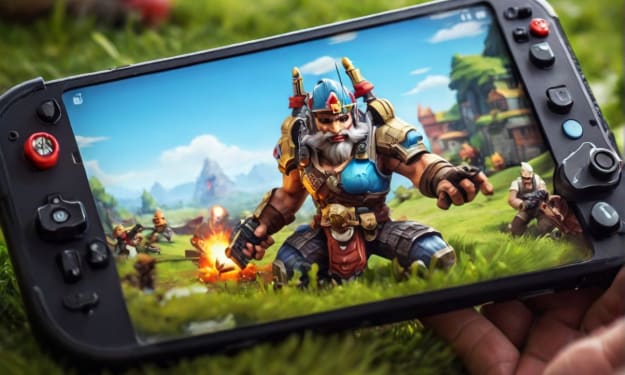The Power of AI
Revolutionizing Video Game Development
The Role of AI in Video Game Development: AI has revolutionized gaming by making it more challenging, realistic, and engaging, enhancing user experience, accelerating development processes, and creating sophisticated opponents, realistic environments, and personalized experiences.
AI in Video Game Development
Artificial Intelligence (AI) has significantly reshaped the landscape of video game development, ushering in a new era of innovation and creativity. By integrating intelligent algorithms and systems into video games, AI has revolutionized the way games are designed, developed, and experienced. This transformation has had a profound impact on various aspects of the gaming industry, from game design and mechanics to narratives and testing [1]. The role of AI in video game development is multifaceted, encompassing the enhancement of user experience, acceleration of development processes, and simplification of iteration. These advancements have led to the creation of more challenging, realistic, and engaging gaming experiences for players with immersive 3D environments.
The influence of AI in video game development extends beyond the technical realm, as it also plays a pivotal role in shaping the overall gaming experience. For instance, AI algorithms are commonly employed to create sophisticated opponents that dynamically adapt to the player's strategies, resulting in a more immersive and dynamic gaming experience. Additionally, AI has streamlined the iteration process, allowing developers to test and refine game mechanics and narratives more efficiently, ultimately contributing to the creation of more engaging and realistic virtual worlds. AI in gaming involves integrating intelligent algorithms and systems into video games. The integration of AI in video game development is a testament to the industry's commitment to leveraging cutting-edge technologies to deliver unparalleled gaming experiences to a global audience.
Moreover, the impact of AI on video game development goes beyond the gaming experience itself, influencing the future trajectory of game development. As AI technologies continue to advance, the potential for further innovation and creative expression in game development becomes increasingly promising. The intersection of AI and game development represents a convergence of technological prowess and artistic vision, shaping the future of the gaming industry in profound ways. The integration of AI in video game development is not just a technical advancement; it is a testament to the industry's commitment to pushing the boundaries of creativity and innovation to deliver unparalleled gaming experiences to a global audience.
AI Techniques and Algorithms Used in Game Development
AI techniques and algorithms form the backbone of advancements in video game development, enabling developers to create more immersive and dynamic gaming experiences. One of the most prevalent AI techniques utilized in game development is machine learning, which empowers AI agents in games to learn from player actions and dynamically adapt their strategies. This capability results in more responsive and challenging opponents, enhancing the overall gaming experience. An exemplary use of machine learning in game development can be observed in "The Last of Us Part II," where AI-controlled enemies adapt their behavior based on the player's actions, creating a more dynamic and engaging gaming experience.
Furthermore, pathfinding algorithms play a crucial role in enabling characters and non-player characters (NPCs) to navigate through complex game environments seamlessly. Games such as "Assassin's Creed Valhalla" leverage pathfinding algorithms to allow NPCs to move realistically through the game's open-world setting, contributing to a more immersive and believable game world. Additionally, behavior trees, another prominent AI technique, govern the decision-making process of NPCs based on predefined rules and priorities, allowing for the creation of diverse and contextually relevant behaviors. This enriches the overall gaming experience by creating more dynamic and lifelike interactions within the game world. An example of this can be observed in "Red Dead Redemption 2," where NPCs exhibit complex and diverse behaviors, contributing to the game's immersive and dynamic world.
The integration of these AI techniques and algorithms demonstrates the industry's commitment to leveraging cutting-edge technologies to create more engaging, challenging, and immersive gaming experiences. It underscores the pivotal role of AI in shaping the future trajectory of game development, where innovation and creativity converge to deliver unparalleled gaming experiences to a global audience.
Benefits of AI in Video Games
The incorporation of AI in video games yields a multitude of benefits, fundamentally transforming the gaming experience and setting new standards for player engagement and immersion. One of the primary advantages of AI in gaming is its ability to dynamically adjust game environments based on player actions, resulting in more responsive and engaging experiences. For instance, AI algorithms are employed to create diverse game scenarios, ensuring that players encounter a wide array of challenges and experiences throughout their gaming journey. This contributes to the longevity and replayability of games, as players are presented with unique and unforeseen situations, keeping the experience fresh and engaging.
Moreover, AI technology facilitates real-time analytics, providing developers with valuable insights into player behavior and preferences. This data-driven approach enables developers to make informed decisions about game design and mechanics, ultimately enhancing the overall gaming experience. Additionally, AI contributes to the efficient development of in-game characters by streamlining the creation process, resulting in more compelling and diverse personas that enrich the game's narrative and gameplay experience. Furthermore, AI-driven non-player characters (NPCs) exhibit behaviors that make their interactions with players more dynamic and lifelike, contributing to a more immersive and believable game world.
The benefits of AI in video games extend beyond technical advancements, shaping the future trajectory of the gaming industry and redefining the boundaries of creativity and innovation. The integration of AI technologies underscores the industry's commitment to delivering unparalleled gaming experiences to a global audience, leveraging cutting-edge technologies to push the boundaries of creativity and innovation.

Examples of AI in Popular Video Games
AI technologies have been instrumental in shaping the gaming experiences of popular video games, providing players with immersive, challenging, and dynamic gameplay. In the game "Red Dead Redemption 2," AI is leveraged to generate lifelike wildlife behavior, weather patterns, and non-scripted interactions, contributing to the game's highly immersive open-world experience. Furthermore, the game "Alien: Isolation" employs AI to power the behavior of the unpredictable and adaptive alien antagonist, providing players with a nerve-wracking and intense gaming experience where the opponent intelligently learns and adapts to the player's actions, enhancing the overall gameplay dynamics. These examples highlight the significant impact of AI in popular video games, showcasing how AI technologies have shaped the gaming experiences enjoyed by millions of players worldwide.
Additionally, AI has played a pivotal role in creating realistic and immersive environments in popular video games, contributing to the overall gaming experience. For example, in "The Last of Us Part II," AI algorithms dynamically adjust the behavior of non-player characters, creating a more dynamic and immersive gaming experience. Moreover, AI is utilized to create sophisticated opponents in games like "Assassin's Creed Valhalla," where NPCs exhibit dynamic and lifelike behaviors, enhancing the overall gaming experience. These examples underscore the diverse applications of AI in popular video games, demonstrating how AI has transformed the gaming experience by creating more engaging, challenging, and immersive virtual worlds.
The integration of AI in popular video games exemplifies the industry's commitment to leveraging cutting-edge technologies to deliver unparalleled gaming experiences to a global audience, pushing the boundaries of creativity and innovation to shape the future trajectory of game development.
Future Prospects of AI in Game Development
The future of AI in video game development holds immense promise, with the potential to reshape the industry and redefine the boundaries of creativity and innovation. The utilization of advanced AI technologies, such as Generative Adversarial Networks (GANs), is poised to revolutionize game development by enabling the creation of new game content. GANs have the capability to generate realistic images, sounds, and even game environments, offering endless possibilities for game developers to craft engaging and diverse experiences for players.
Moreover, the integration of AI is anticipated to result in millions of jobs within the gaming industry, creating opportunities for innovative game development and the potential to impact various other sectors. The advancements made in game development can be leveraged in other applications, such as simulations, training programs, and virtual environments, translating into real-world efficiencies across industries. This cross-industry impact underscores the far-reaching influence of AI in shaping not only the future of gaming but also broader technological landscapes.
Furthermore, AI is expected to introduce numerous groundbreaking features in game development, including enhanced realism, procedurally generated worlds, AI co-op partners, AI-generated music, and natural language interaction. These advancements promise to elevate the gaming experience by creating more immersive, interactive, and dynamic gameplay, transforming the way players engage with and enjoy video games. The introduction of AI-driven game mastering can personalize and adapt gameplay experiences based on individual player preferences, offering a level of customization and engagement previously unattainable.
The future prospects of AI in game development underscore the industry's commitment to leveraging cutting-edge technologies to deliver unparalleled gaming experiences to a global audience, pushing the boundaries of creativity and innovation to shape the future trajectory of game development.
AI in Gaming Industry
The impact of AI in the gaming industry is far-reaching, extending to various aspects of game development, player engagement, and innovation. AI has played a pivotal role in revolutionizing the industry by creating immersive experiences and streamlining development processes, redefining the boundaries of creativity and innovation. As a result, AI has not only transformed game development but has also contributed to job transformations within the industry, opening up new opportunities for innovative game development and creative expression.
The integration of AI technologies has also facilitated the creation of procedurally generated worlds, AI co-op partners, and AI-generated music, ushering in a new era of dynamic and interactive gameplay experiences. For instance, the utilization of AI in game development enables the creation of lifelike characters, dialogue, and environments, significantly enhancing the overall gaming experience. These advancements have redefined the gaming experience, making it more dynamic and interactive, thereby captivating a wider audience.
Furthermore, AI has empowered smaller studios to compete with larger companies and foster a more innovative gaming landscape. The democratization of game development through AI technologies has resulted in job transformations and the creation of more diverse and compelling gaming experiences. The future of the industry with AI includes job transformations, enhanced realism, procedurally generated worlds, AI co-op partners, AI-generated music, natural language interaction, and AI-driven game mastering, offering unparalleled possibilities for creating engaging and immersive gameplay experiences.
The integration of AI in the gaming industry underscores the industry's commitment to leveraging cutting-edge technologies to push the boundaries of creativity and innovation, delivering unparalleled gaming experiences to a global audience.
AI Technology in Gaming
AI technology has become an indispensable tool in the gaming industry, enabling developers to create more immersive, dynamic, and engaging gaming experiences. One of the most notable impacts of AI in gaming is the transformation of job roles within the industry, with the potential for game developers to streamline various processes, including character development, environment creation, and quality assurance. This transformation has not only optimized efficiency but has also opened up new job opportunities in areas such as AI-driven game mastering and procedural content generation, aligning with the projection that AI will manage over half of game development within 5 to 10 years.
Moreover, AI has played a pivotal role in enhancing the realism of virtual worlds in video games, shaping the future trajectory of game development. Through AI, game developers can create procedurally generated worlds that offer an unprecedented level of complexity and immersion for players. This has redefined the gaming experience, making it more dynamic and interactive, thereby captivating a wider audience. Additionally, AI-generated music has become an emerging trend in the gaming industry, allowing for dynamic and adaptive soundtracks that respond to the actions and progress of players, further enhancing the overall immersion and engagement in games.
Furthermore, AI technology has facilitated the development of AI co-op partners, enabling single-player games to incorporate intelligent, responsive non-player characters (NPCs) that adapt to the player's actions and strategies. This has resulted in more dynamic and engaging gameplay experiences, where players can collaborate with AI-driven partners that evolve and learn from their interactions. An excellent example of this is the implementation of AI co-op partners in the game "Left 4 Dead," where AI-controlled characters provide support and assistance to players, creating a more immersive and challenging gaming environment. These advancements underscore the critical role of AI in shaping the future of game development and its potential to revolutionize the gaming experience.
AI in Media & Entertainment
The integration of AI in media and entertainment has significantly transformed the industry, particularly in content creation and distribution. For instance, Netflix has utilized AI algorithms to personalize content recommendations for its users, enhancing the overall viewing experience and increasing user engagement. This implementation of AI has not only streamlined the content delivery process but has also contributed to the platform's success in retaining subscribers.
Moreover, AI has revolutionized the music streaming industry, with Spotify leveraging AI to curate personalized playlists for its users based on their listening habits and preferences. By analyzing vast amounts of data, AI algorithms can accurately predict the music that users are likely to enjoy, creating a more immersive and tailored music experience. This demonstrates how AI has become an indispensable tool for enhancing user engagement and satisfaction in the entertainment sector.
Furthermore, the global AI in the media & entertainment market, which reached a valuation of USD 10.87 billion in 2021, is expected to experience a remarkable Compound Annual Growth Rate (CAGR) of 26.9% from 2022 through 2030. This growth trajectory underscores the widespread adoption of AI technologies across various segments of the media and entertainment industry, signifying the immense potential and benefits that AI brings to content creation, distribution, and user experience.
The integration of AI in media and entertainment not only demonstrates the industry's commitment to leveraging cutting-edge technologies to enhance content creation and distribution but also underscores the potential for AI to revolutionize the way audiences engage with and consume media and entertainment.
Conclusion
In conclusion, the role of AI in video game development is pivotal, shaping the future trajectory of game development and redefining the boundaries of creativity and innovation. The integration of AI technologies underscores the industry's commitment to leveraging cutting-edge technologies to deliver unparalleled gaming experiences to a global audience, pushing the boundaries of creativity and innovation to shape the future trajectory of game development.
About the Creator
Timothy A Rowland
I’m an every day human Xennial from the United States. I have many interest. I just want to improve your life and maybe entertain you. Available for editing and LeadsLeap projects at: https://www.fiverr.com/greyhatcompany







Comments
There are no comments for this story
Be the first to respond and start the conversation.